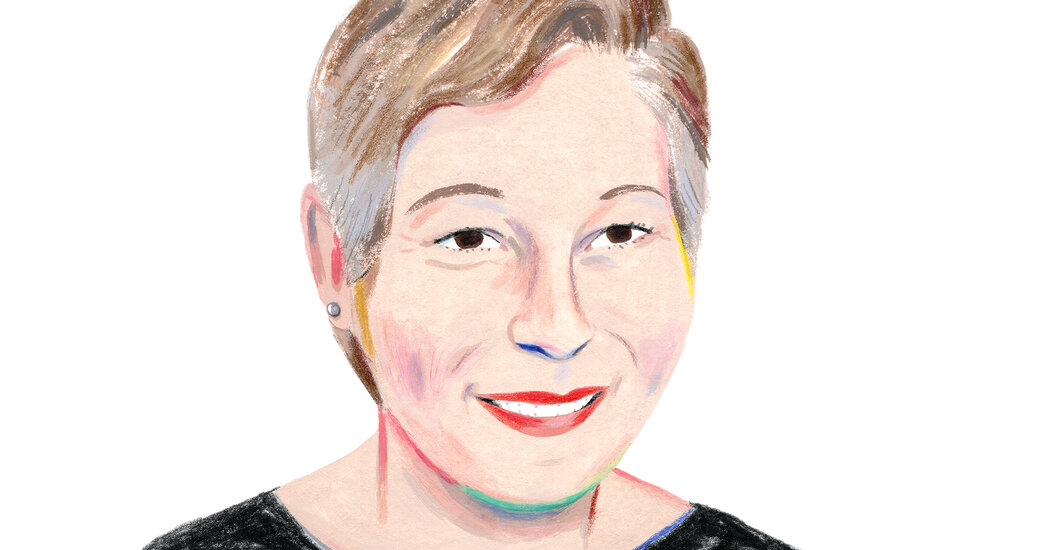A reluctant estate saleswoman is tasked with clearing out a house of ill repute in Lipman’s new comic novel. In an email interview, she shared some of her own nifty purchases, and explained why she folds readers’ suggestions into her work. SCOTT HELLER
What books are on your night stand?
“Vows: The Story of a Priest, a Nun, and Their Son,” by Peter Manseau (a priest turns up in my next novel); “Emma,” in conjunction with “Collected Stories of F. Scott Fitzgerald” (because I’m contributing to “Ladies in Waiting: Jane Austen’s Unsung Characters” and the working title of my story is “Miss Bates Bobs Her Hair”); “Eddie Winston Is Looking for Love,” by Marianne Cronin; “Displaced Persons,” stories by Joan Leegant; and “A Taste of India,” by Madhur Jaffrey.
What’s the last great book you read?
“The Silence of Your Name: The Afterlife of a Suicide,” by Alexandra Marshall.
What books are you embarrassed not to have read yet?
William Faulkner’s. Not that I didn’t try.
What’s your favorite book no one else has heard of?
“Never heard of” is harsh, but I do worry that “The Wright Sister,” by Patty Dann, went unanointed. I love epistolary novels, and this “marriage diary” is wonderful: Based on real life, the Wright brothers’ only sister, Katharine, marries for the first time at 52. Surviving bachelor brother Orville never speaks to her again.
Who is your favorite fictional hero or heroine?
Jane Eyre for sure. And more recently, Count Alexander Rostov in “A Gentleman in Moscow,” by Amor Towles. Also, the many good coppers in Peter Grainger’s DC Smith Investigation novels.
How have your reading tastes changed over time?
I read many more memoirs and biographies. As for fiction, I am less tolerant of grandiosity, impatient with descriptions trying to be poetic — the fancy weather that opens chapters, the cerulean skies, the irrelevant passing scenery. No thank you. A relatively new experience: I always have an audiobook going.
Are you an estate-sale shopper? What gems have you turned up?
I am. This is more about provenance than the objets, but I now own Beverly Sills’s electric teakettle and egg slicer.
Might the Trump administration return as a backdrop to your writing, as it did in 2021’s “Rachel to the Rescue”?
Not if my agent and editor have a say.
With so many novels under your belt, are there new goals you hope to accomplish when you start a new book?
I want to get my characters out of the house, to do more than just talk over dinner. I need to push myself to insert action and description, and I’m always mindful of one editor’s margin note in “Isabel’s Bed”: “Could someone here please pass the potatoes?”
What’s the most interesting thing you learned from a book recently?
In “To Repair a Broken World: The Life of Henrietta Szold, Founder of Hadassah,” by Dvora Hacohen, I learned that there were exactly 13 Jewish families living in Edinburgh in 1909. Just 13! And in “Connie,” by Connie Chung: She was the youngest of 10 children, only five survived infancy, all girls, and she’s the only one born in the U.S.
Tell me a great story about meeting with a book group that’s read your work.
It was at a book signing. A smiling woman announced, “We read ‘The Ladies’ Man’ in our pretend book group.” I asked, “Pretend book group! What’s that?” She said, “Oh, we assign a book then get together and talk about menopause.” She added that mine was the only book that everyone had read.
Why did you crowdsource for help on naming businesses in “Every Tom, Dick & Harry”?
I guessed correctly that I’d get dozens of suggestions, and it would be fun to curate them. Facebook friends came through in minutes. Some were extremely clever — such as “You Can’t Take It With You” — but were too long to be used, page after page, as the name of Emma’s company.
Why admit it?
Soliciting potential names for a business doesn’t strike me as cheating. An unexpected payoff was that the owner of a real-life estate-sale business offered her help. She had a very entertaining point of view about clients and their stuff.
Have you ever gotten in trouble for reading a book?
Not me, but a good friend did. Her crime was choosing a novel from the adult shelf in the bookmobile that came to our middle school once a week. She was banned from the bookmobile for weeks. The book? A Jack Kerouac novel. And this was in Lowell, Mass., Kerouac’s birthplace.
Which subjects do you wish more authors would write about?
Art forgery, art thievery, art plundered by Nazis that’s returned to its owners or their progeny.
You’re organizing a literary dinner party. Which three writers, dead or alive, do you invite?
Two very dear, best writer friends I’ve lost: Anita Shreve in 2018 and Mameve Medwed in 2021. What I wouldn’t give. … Plus Stacy Schiff, alive and writing. She knew and loved them, too. And she’d make us laugh.
